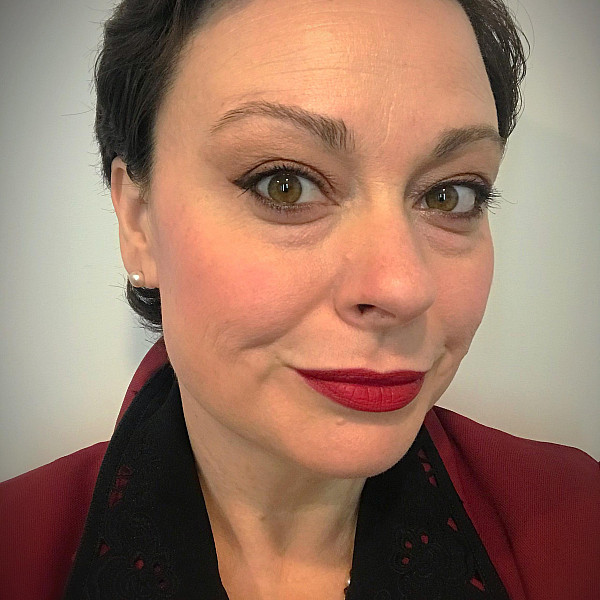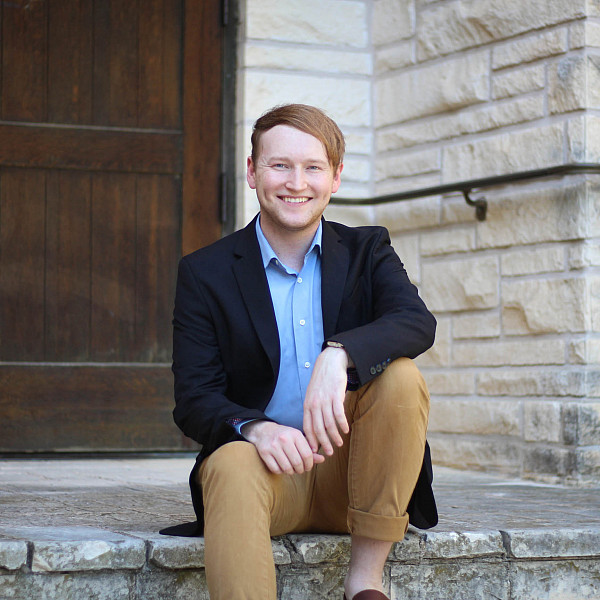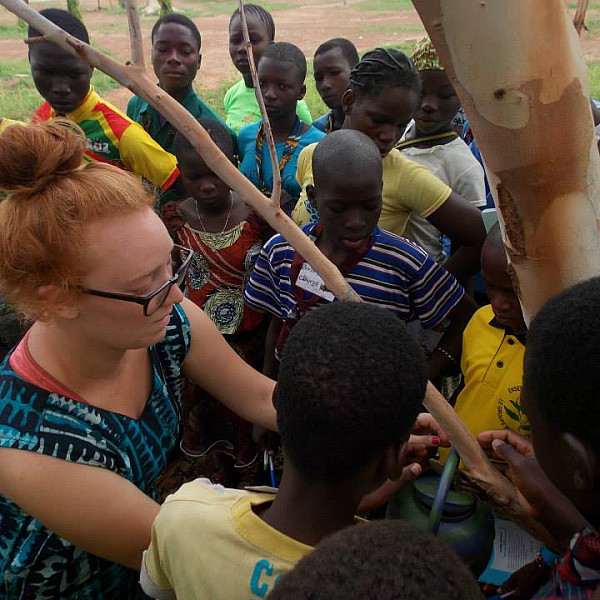News
The Wheel’s Still in Spin
May 18, 2021
May 18, 2021
Open gallery

For so many of us who major in English in college, reading is a portal that empowers us to inhabit (if only temporarily) new ways of thinking or living. That experience holds true for Southwestern alum Delilah Dylan Dominguez ’09. “Some of my earliest memories involve books transporting me to imaginative spaces where I encountered people and places foreign to me,” she says. “From the start, my mother shared her reverence for books with me, emphasizing their tremendous power to transport and transform people.” Growing up in Bastrop, Dominguez discovered that reading allowed her to escape from the monotony of small-town Texas life. That portal to fascinating other worlds deepened her empathy and encouraged self-reflection. “Stories and characters provoked feelings and thoughts that taught me to enter the minds and souls of others. Books transformed my understanding of myself and others,” she explains. “They also provided me with otherwise unimaginable opportunities because they helped me achieve higher education.”
Like the protagonist of a great book or the archetypal hero of any journey, transformation has shaped Dominguez’s experience. When she began her studies at Southwestern University, she decided to major in English, convinced that she’d eventually become an English professor and “dedicate [her] life to stories.” Since graduating, she has instead earned a master of fine arts in dramaturgy and dramatic criticism at the prestigious Yale School of Drama, a master of science in social work from the University of Texas at Austin, and a master of health science from the Quinnipiac University Physician Assistant (PA) Program. In 2020, she was recognized as PA Student of the Year by the American Academy of Physician Assistants, a professional organization representing 140,000 members. Today, she is a practicing PA in New Haven, Connecticut.
Such significant deviations from the bibliophile’s initial plans might surprise those who think the line between college major and career is a direct one. But the story of the SU alum’s career will ring familiar to those who have similarly pursued academic studies and professional paths in disparate fields. It also aligns with the reason she changed her middle name from the ill-fitting Nicole to honor the much-loved singer and storyteller Bob Dylan: “It reminds me that we can always be whoever we want to be,” she explains.
Finding one’s community
During her first days at Southwestern University, Dominguez admittedly felt overwhelmed. “As a first-generation college student, I did not know what to expect from my university experience,” she shares. SU was also not as racially diverse in those days: today, 25% of the student body identifies as Hispanic and 5% identifies as Black, but in 2005, when Dominguez was a first-year student, only 13.9% of the students on campus identified as Hispanic and 3.1% as Black. Nevertheless, Dominguez discovered a welcoming home. “Despite a general lack of racial and ethnic diversity on campus,” she says, “I found community in professors, students, and staff who celebrated their cultures.”
One of those communities was the golf team. “It was a huge part of my college experience,” she recollects. “As a game, golf encouraged me to develop self-awareness, perseverance, and patience. I learned that I could practice, but no matter how much I prepared, elements beyond my control and unforeseen obstacles presented themselves in each round. How I responded to those challenges determined how well I ultimately performed.” Looking back, the former athlete says that she realizes how much golf taught her how to live and confront setbacks. “The game schooled me in life’s unpredictability,” she shares, “but it showed me that how I responded to adversity was within my power to control. I have carried those lessons with me since.”
“Each of these professors taught me how to navigate university life as a first-generation student.”
Lifelong lessons were also to be learned from several Southwestern faculty. Those mentors were many, but in particular, four were the most influential for Dominguez: Associate Professor of Theatre Sergio Costola, Professor Emeritus of English David Gaines, former Associate Professor of English Elisabeth Piedmont-Marton, and Professor Emerita of French Suzanne Chamier. “Each of these professors taught me how to navigate university life as a first-generation student,” she shares. “They also taught me to have the courage and confidence to begin really discovering who I was as a person. They all challenged me to explore the world and to consider what I valued as a person in it. They all changed my life in their own ways and left indelible marks on me.”
Costola in particular influenced where Dominguez landed directly after graduation. After taking his Theatre History seminar, Dominguez added a perfectly complementary theatre minor to her English major. “Theatre brought literature to life in a more complete way than books alone,” she remembers. “The human body, lights, sets, sounds, audiences, and performers offered dynamic storytelling that excited me.” Invigorated by translating literature through the shared physical experience of the stage, Dominguez applied and was accepted to the Yale School of Drama, one of the nation’s top theatre conservatories, where she pursued a master’s degree in dramaturgy and dramatic criticism.
She initially toyed with the idea of becoming a professor of theatre because, she says, “I loved the dynamic nature of the university environment, where I could discuss and debate ideas with other people.” But there were also inklings—and later neon signs—that something was missing for Dominguez, both personally and professionally, in the theatre of academia.
Trauma and transformation
“Drama school coincided with one of the lowest times in my life,” Dominguez reveals. The Texas native was having trouble adjusting to the culture of the Northeast, and she was just starting to unpack her sexuality. “I found myself at one of the best universities in the world and felt out of place and behind my peers,” she says of those difficult months and years. “I felt depressed and isolated for the first time in my life, and I struggled to keep up with the demands of the program.” It’s an experience not unfamiliar to high-achieving first-generation college students who go on to graduate school. But she was also seeing disappointing discrepancies in racial representation in her field and social inequities in her city. “As a person of color,” she says, “I did not see my experiences reflected in the theatre I was creating or the university community. I also felt bothered by the stark disparities between Yale and the community of New Haven. I began to question what impact I could have on addressing those disparities and social injustice through my involvement in theatre.”
So Dominguez began volunteering at a local hospice agency. She trained to become a direct-care and arts volunteer at Connecticut Hospice, which was founded in 1974 as the first such facility in the U.S. The experience was challenging and eye-opening. “At that time,” she adds, “I was completely unaware of the personal transformation I would consequently undergo.”
Each week, the SU alum says she “faced [her] fears of death and dying” as she “observed many of the sights, sounds, and smells that accompany serious illness.” She talked with clients and their families while working with healthcare teams to promote patients’ quality of life and comfort. “A new depth of human experience opened to me as I realized death’s indiscriminate nature and saw people live and die so diversely,” she reflects.
If you have ever volunteered or worked on the wards in a hospital or hospice setting, you know how uplifting and rewarding the experience can be. But the empathy one develops as a human being and even more so as a lifelong reader can mean that losing patients takes a tremendous emotional toll. In Dominguez’s case, that toll was compounded by immense personal tragedy. Midway through her three-year drama degree at Yale and less than a year after becoming a hospice volunteer, Dominguez lost her 48-year-old mother to a heart attack, her grandmother to cancer, and her uncle to a substance-abuse disorder. She also lost most of her belongings in a wildfire.
Although she had witnessed death on a weekly basis for months, the shock of these closer-to-home losses devastated Dominguez. She was buoyed up briefly by her Southwestern faculty mentors, who had kept in touch with her after she graduated; when her mother passed away in 2011, each one reached out to offer support, and Costola and Piedmont-Marton even attended the funeral. That act of kindness, she says, “still stands out to me when I think about that day. I consider them family.” And as they had in childhood, books provided some solace. Still, it was time for a change. “I reevaluated my personal and professional ambitions,” she says. “While I had turned to the humanities for comfort during that time, I ultimately felt compelled to follow a new direction in which I could more directly help people.”
A passion for stories and social justice
Dominguez considered applying to nursing or medical school, but a strong aversion to blood quickly quelled that idea. After further deliberation, she decided to become a social worker. She had learned about the profession while volunteering at the hospice, and she “strongly identified” with “social work’s commitment to social justice and human dignity.” During her final year at Yale, she applied to a master’s program in social work at the University of Texas at Austin (UT) and was accepted the following year.
Adapted for transformation as a liberal-arts graduate is, Dominguez easily saw how her studies in drama school translated to social work. At the conservatory, she had collaborated with theatre artists and production teams to develop and stage dramatic works. “I functioned as a social worker of sorts,” she explains, “clarifying the goals of the production team, mediating artistic differences, and promoting clear communication among collaborators… . Social work seemed like the best way to combine my passion for people and stories with my desire to help address social justice in a more direct way than I could through theatre.”
“Medical social work combined my artistic, existential, and human sensibilities in a consummate way.”
As a social worker, Dominguez initially aspired to work with older adults to continue exploring her interests in aging and end-of-life. During her training, she interned at a nursing home and an inpatient hospice facility, “discovering,” she says, “that medical social work combined my artistic, existential, and human sensibilities in a consummate way.” After graduating from UT, she worked as a clinical social worker on the geriatric unit at the Austin State Hospital. Her clients’ complex psychiatric and medical conditions furthered her interest in medicine. But, she adds, “I felt outraged by the health disparities I saw.” She began regularly shadowing physicians on their rounds. Soon after, she says, “I acknowledged that I had to study medicine to better understand the clients I wanted to serve and to be a better advocate for them.” She also decided to study medicine so that she could “live a life of service to others” and thereby honor her mother’s life.
Having no advanced science credits and continuing to work full-time as a social worker, Dominguez began taking prerequisite courses at Austin Community College. She set her sights on becoming a physician assistant, she says, because that career “would allow me to practice medicine in a collaborative, team-based model and required less additional time in school than becoming a physician.” As a PA, she could also seek generalist training instead of specializing, allowing her to integrate different fields throughout her career. “Given my experience as a dramaturg and social worker, that versatility appealed to me. I enjoy being able to fill gaps in systems,” she says. In 2018, she moved back to the Northeast to begin Quinnipiac University’s renowned PA Program.
A “loving whisperer”
Exemplary of her above-and-beyond approach to academics and career, during her first semester at Quinnipiac, Dominguez began a two-year volunteer commitment with the Urban Service Track/Area Health Education Center Scholars Program, an interdisciplinary initiative that aims to increase the number of qualified health professions providing primary care in underserved communities. In addition to engaging in learning retreats and additional training in clinical and patient counseling skills, she volunteered more than 80 hours with community health fairs, a migrant farm clinic, regional food banks, biomedical engineering discovery programs, and dental health programs. She also returned to Connecticut Hospice, which she describes as “coming full circle and returning to the place that first inspired me to become a social worker.” She volunteered more than 125 hours at the hospice, again working in direct care. “I also serve as a ‘loving whisperer’ by offering bedside companionship for individuals who are actively dying without anyone present,” she adds. Even further, Dominguez volunteered more than 37 hours through activities hosted by Quinnipiac’s PA student society, including literacy and nutrition education programs in schools, fundraisers, health fairs, and food and clothing distribution as well as foot care clinics for individuals experiencing homelessness. Her deep commitment to both her profession and to her community earned her the 2020 PA Student of the Year award by the American Academy of Physician Assistants.
“I am humbled by the opportunity to serve others,” Dominguez says. “I am passionate about becoming a well-rounded clinician who is able to use her knowledge to expand access to quality healthcare for underserved populations. Leadership and advocacy can literally save lives, especially for the medically underserved. I want to dedicate my life to that purpose.”
The Southwestern alum has certainly fulfilled that purpose so far. Since graduating in 2020 with her third graduate degree, she has worked as a certified PA in New Haven, near her second alma mater. “I most enjoy the privilege of serving a diverse group of people every day,” she comments. “Patients teach me something every time I interact with them. I consider it an honor to be invited into some of their most intimate and vulnerable moments and be entrusted to offer suggestions and guidance about their situations.” Beyond caring for patients during the height of the COVID-19 pandemic, there are systemic challenges in her work, of course, such as “mak[ing] healthcare more affordable and accessible for all” and tearing down “legislative barriers that prevent PAs from practicing at the highest levels of their training in different states.” However, with the perspective of the former SU golfer who can treat setbacks as occasions for growth and progress, Dominguez says that such challenges “also provide opportunities for legislative advocacy. It is an exciting time to be a PA and be able to help shape the profession through such efforts.”
Dominguez still loves reading and the way that books facilitate escape, encouragement, and empathy during even the darkest times. “Though I set out to be an English major, I never intended to be a dramaturg, social worker, or PA,” she says. “I was drawn to literature, theatre, social work, and medicine because of my deep love of people and their stories. The injustice and inequality in the world infuriate me. As a PA, I have been able to combine everything that I have learned about people through the humanities and social sciences with my growing medical knowledge to approach patients as whole, complex individuals. I would be a far less effective medical professional had I not had such an unconventional background.” Hers may seem like a winding career path, but, as Dominguez demonstrates, it’s been essential to the success of this essential worker.


















